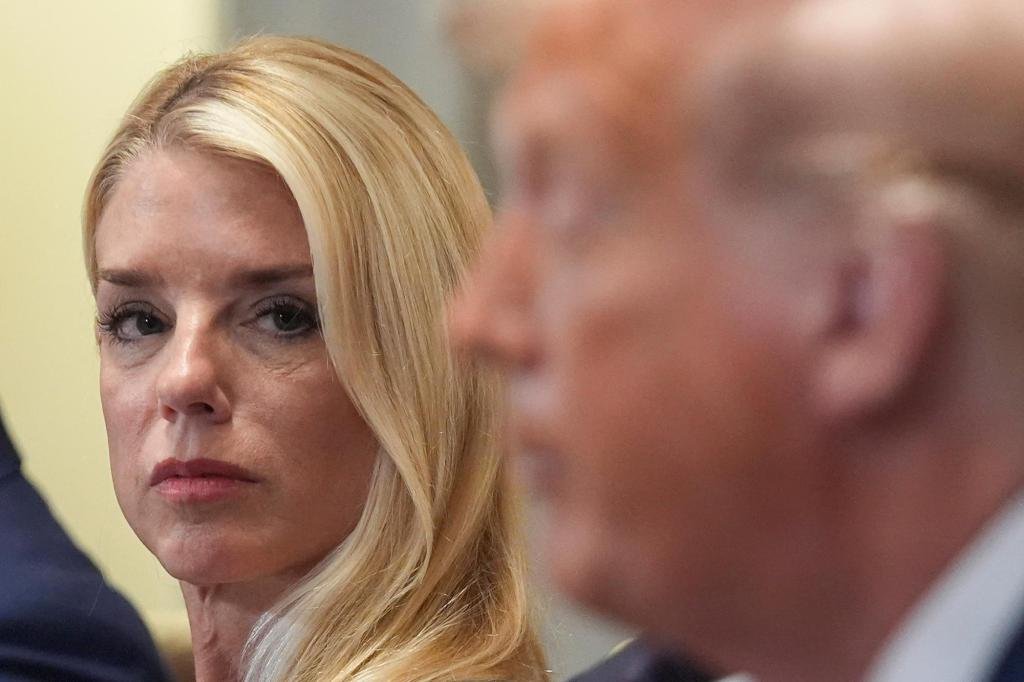Trump’s Defense of Pam Bondi: A Deep Dive into the Epstein Files Controversy
In the sleek corridors of the White House, as the sun streamed through the glass facade, a heated exchange unfolded over one of the most sensational cases in recent American history—the Jeffrey Epstein sex-trafficking investigation. On one side stood President Donald Trump, staunchly defending his Attorney General, Pam Bondi, while on the other, escalating criticism from far-right influencers painted a turbulent picture of disappointment and conspiracy. “Are you still talking about Jeffrey Epstein?” Trump retorted, dismissing further questions as a distraction from more pressing issues facing the nation.
The Epstein Legacy: An Unraveling Mystery
The Epstein saga is entwined with questions of power, abuse, and political maneuvering. Former financier Jeffrey Epstein, who was charged with running an elaborate child sex-trafficking ring, died under suspicious circumstances in a Manhattan jail cell in August 2019, leaving behind a shroud of unanswered questions. Amid rising public scrutiny, Bondi had previously suggested there could be incriminating files related to high-profile figures, spurring hopes within conservative circles that revelations were imminent. Yet, a recent memo from the Justice Department dashed those expectations, stating no further disclosures would be made—a reality Bondi found herself scrambling to explain.
Amidst a Backlash
As the Justice Department issued its memo confirming that a much-hyped release was not forthcoming, far-right influencers took to social media platforms, fuming and calling for Bondi’s resignation. They were particularly incensed by her earlier statements that a “client list” was languishing on her desk awaiting review—statements Bondi now clarified were misinterpreted. The fallout revealed a fracture not only between the establishment and grassroots supporters but also among Trump loyalists, many of whom felt betrayed.
- Public Discontent: Far-right influencers questioned Bondi’s transparency.
- Media Critique: Journalists highlighted discrepancies in her statements.
- Political Fallout: Calls for resignation echoed through online forums.
“This situation exemplifies the dissonance between political rhetoric and the reality of governance,” stated Dr. Emily Harper, a political analyst at the Center for Integrity in Governance. “When public expectations do not align with the administration’s actions, it breeds discontent among core supporters.” Through her lens, the episode illustrated a wider trend where governance and social media dynamics frequently clash, leading to unpredictable political ramifications.
The Dynamics of Disclosure
The Justice Department’s revelations—or lack thereof—over this case have been under intense scrutiny. Their memo indicated that much of the material concerning Epstein was sealed by a court in an effort to protect victims, leaving only a sliver of potential evidence for public consumption. This stark reality contrasts sharply with the expectations set forth by Bondi and her subsequent attempts to justify her earlier claims.
While the memo did disclose a video to support allegations surrounding Epstein’s death, it did little to appease conspiracy theorists who continue to insist that foul play was at hand. “Even when presented with empirical evidence, these narratives persist,” noted Dr. Carlos Reeve, a psychologist specializing in belief systems. “The allure of conspiracy often speaks to deeper societal anxieties about trust and authority.”
Online Detectives and the Quest for Truth
The disappointment among far-right influencers and “digital detectives” is palpable. Many took to online forums to air grievances, lamenting once again the absence of hard evidence against prominent individuals connected to Epstein. The efficacy of the Internet as a tool for investigative journalism has been undermined by a growing mistrust in mainstream narratives. To many, the belief that there exists untold stories locked away by the government stands firm.
In a Fox News interview earlier this year, Bondi had hinted at the existence of documents that could spell major revelations, stating, “There’s a truckload of evidence being reviewed.” However, the Justice Department’s recent memo negated many of those expectations, noting that only a fraction of the evidence collected would ever see the light of day even if Epstein had gone to trial.
“These events highlight a paradox of our era where uncovering the truth is often entangled with the perilous fog of misinformation,” explained Dr. Jenna Lin, an associate professor of media studies. “When institutions fail to deliver on their promises, the vacuum is filled with speculation, conspiracy, and outrage.”
The Broader Implications
The great irony of this unfolding narrative is that amid the fervent calls for transparency, the administration has chosen secrecy as a shield. With investigations underway and myriad parties clamoring for accountability, the political implications are profound. “The Epstein case is emblematic of systemic failures in judicial transparency and political accountability,” stated Dr. Myles Carter, a sociologist who focuses on power dynamics in modern governance.
As Trump’s loyal base continues to grapple with disillusionment, the episode reveals much about the challenges of navigating complex socio-political landscapes in contemporary America. While influences from online communities can both empower and undermine political narratives, the fallout from this saga underscores a worrying trend: the gap between public expectation and governmental action continues to grow.
As the whispers of conspiracy theories fill the airwaves and online forums, the Epstein investigation remains not merely an issue of individual accountability but a lens through which we examine deeper societal fractures. With the investigations less about the particulars of the case and more about the inherent distrust of authority, the next chapter in this story may very well redefine the boundaries of American political discourse.





